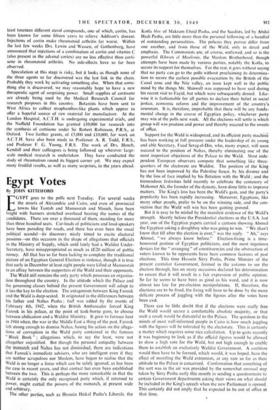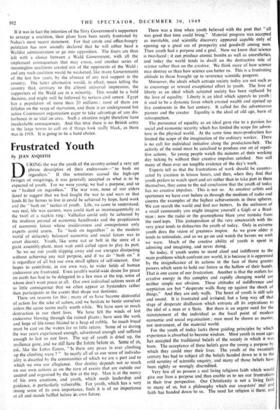Egypt Votes
tt' JOHN KITTESFORD
FGYPT goes to the polls next Tuesday. For several weeks the streets of Alexandria and Cairo, and even of provincial towns like Tantah and Mansourah and Minieh, have been bright with banners stretched overhead bearing the names of the candidates. There are over a thousand of them, standing for more than three hundred seats. Car-loads of politicians and loud-speakers have been parading the roads, and there has even been the usual political scandal—its discovery nicely timed to excite electoral passions—on this occasion in the shape of allegations that officials in the Ministry of Supply, which until lately had a Wafdist Under- Secretary, have misappropriated as much as £E20 million of public money. All that has so far been lacking to complete the traditional picture of an Egyptian General Election is violence, though it is true that early in December at least eight people were killed at Mansourah in an affray between the supporters of the Wafd and their opponents.
The Wafd still remains the only party which possesses an organisa- tion throughout the country. In the attitude which the Palace and the governing classes behind the present Government will adopt to it lies the key to the election. The antagonism between King Farouk and the Wafd is deep-seated. It originated in the differences between his father and Nahas Pasha ; fuel was added by the events of February 4th, 1942, when the British Ambassador forced King Farouk in his palace, at the point of tank-borne guns, to choose between abdication and a Wafdist Ministry. It grew to furnace heat in 1944 when, the war in the Middle East a thing of the past. Farouk felt strong enough to dismiss Nahas, basing his action on the allega- tions of corruption in the Wafd party contained in thz famous " Black Book " ; allegations which, to say the least, were not altogether unjustified. But though the personal antipathy between the monarch and Nahas has not diminished, there are indications that Farouk's immediate advisers, who are intelligent even if they are neither scrupulous nor Moslem. have begun to realise that the Wafd is no longer a force which can be safely ignored, as has been the case in recent years, and that contact has even been established between the two. This is perhaps the more remarkable in that the Wafd is certainly the only recognised party which, if returned to Power, might curtail the powers of the monarch, at present wide and arbitrary. The other parties, such as Hussein Heikal Pasha's Liberals, the Kotla blue of Makram Ebeid Pasha, and the Saadists, led by Abdul Hadi Pasha. are little more than the personal following of a handful of outstanding personalities. The policies they pursue differ from one another, and from those of the Wafd, only in detail and emphasis. The Communists are, of course, outlawed, and so is the powerful Allwan el Muslin:in. the Moslem Brotherhood, though attempts have been made by various parties, notably the Kotla, to secure its support for themselves. For the rest, it goes without saying that no party can go to the polls without proclaiming its determina- tion to secure the earliest possible evacuation by the British of the Canal zone and the Nile valley, an issue kept well in the public mind by the things Mr. Shinwell was supposed to have said during his recent visit to Fayid, but which were subsequently denied. Like- wise it is fashionable for all parties to declare their belief in social justice, economic reform and the improvement of the country's resources. It is, therefore, improbable that there will be any funda- mental change in the course of Egyptian policy, whichever party may win at the polls next week. All the elections will settle is which group will win position and power and thereby succeed to the sweets of office.
Support for the Wafd is widespread, and its efficient party machine has been working at full pressure under the leadership of its young and able Secretary, Fuad Serag-el-Din, who, many expect, will soon succeed to the position of Nahas, thereby eliminating one of the most important objections of the Palace to the Wafd. Most inde- pendent European observers compute that something like three- quarters of the electorate are Wafdist. The position of the King has not been improved by the Palestine fiasco, by his divorce and by the loss of face implied by his flirtation with the Wafd ; and the tremendous festivities held recently to celebrate the centenary of Mahomet Ali, the founder of the dynasty, have done little to improve matters. The King's loss has been the Wafd's gain, and the party's popularity has been rapidly increasing. Moreover, Egyptians, like many other people, prefer to be on the winning side, and the con- viction that the Wafd will win has been gaining ground.
But it is easy to be misled by the manifest evidence of the Wafd's strength. Shortly before the Presidential elections in the U.S.A. last year, one of the Egyptian papers carried a cartoon showing Ahmed the Egyptian asking a doughboy who was going to win. " We shan't know that till after the election is over," was the reply. " Ah," says Ahmed, " we always know before." Election-fixing is a time- honoured pastime of Egyptian politicians, and the most ingenious devices for the " arranging " of constituencies and the obstruction of voters known to be opponents have been common features of past elections. This time Hussein Sirry Pasha, Prime Minister of the present caretaker Government, formed in the autumn to see the election through, has on many occasions declared his determination to ensure that it will result in a fair expression of public opinion. So far he seems to have been as jood as his word, and it is now almost too late for pre-election manipulations. If, therefore, the elections are to he fixed, the fixing will have to be done by the more delicate process of juggling with the figures after the votes have been cast.
There can be little doubt that if the elections were really free the Wafd would secure a comfortable absolute majority, or that such a result would be distasteful to the Palace. The question in the minds of most well-informed people in Cairo is how much juggling with the figures will be tolerated by the electorate. This is certainly a matter which requires some nice calculation. Up to quite recently it was beginning to look as if the official figures would be allowed to show a high vote for the Wafd, but not high enough to enable them to establish an exclusively Wafdist Government. A coalition would then have to be formed, which would, it was hoped, have the effect of muzzling the Wafd extremists, at any rate so far as their attitude to the Palace is concerned. Confirmation that something of the sort was in the air was provided by the somewhat unusual step taken by Sirry Pasha early this month in sending a questionnaire to certain Government departments asking their views on what should be included in the King's speech when the new Parliament is opened. This certainly did not imply that he expected to be out of office at that time.
If it was in fact the intention of the Sirry Government's supporters to arrange a coalition, their plans have been neatly frustrated by Nahas's most recent statement. For that astute and office-hungry politician has now soundly declared that he will either head a Wafdist administration or go into opposition. The fixers are thus left with a choice between a Wafd Government, with all the unpleasant consequences that may ensue, and another series of meaningless coalitions created out of the opponents of the Wafd ; and any such coalition would be weakened, like many Governments of the last few 'ears, by the absence of any real support in the country. The latter alternative would, in effect, mean telling the country that, contrary to the almost universal impression, the supporters of the Wafd are in a minority. This would be a bold decision, and might well be followed by serious civil unrest. Egypt has a population of more than 20 millions ; most of them are fellahin on the verge of starvation, and there is an underground but active Communist organisation eager to take advantage of any dis- turbance in so vital an area. Such a situation might therefore have incalculable consequences. And this time there is no British army in the large towns to call on if things look really black, as there Was in 1919. It is going to be a hard choice.































 Previous page
Previous page